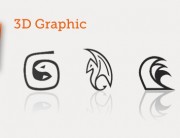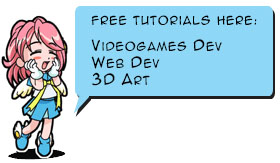Unity 3D Game Engine – JavaScript – Coroutines
Coroutines permettono di gestire comportamenti complessi tra classi differenti.
Coroutines possono essere pensate come funzioni da eseguire a intervalli.
Le Coroutine vanno pecificate con Maiuscolanome+Coroutine, ad esempio MyCoroutine StopCoroutine etc…
Basic
1. Creo un Cube
2. Creo una Sphere ed assegno Coroutine.js
Coroutine.js:
#pragma strict
public var smoothing : float = 1f;
public var target : Transform; // Inspector DRAG over here another GameObject
function Start ()
{
MyCoroutine(target);
}
function MyCoroutine (target : Transform)
{
while(Vector3.Distance(transform.position, target.position) > 0.05f)
{
transform.position = Vector3.Lerp(transform.position, target.position, smoothing * Time.deltaTime);
yield;
}
print("Reached the target.");
yield WaitForSeconds(3f);
print("MyCoroutine is now finished.");
}
3. Sphere> Inspector> Couroutine.js> DRAG AND DROP Cube GameObject over var target
4. Play: Sphere raggiungerà si muoverà con interpolazione lineare (Lerp) il Cubo-> print(“Reached the target.”)-> dopo 3 sec-> print(“MyCoroutine is now finished.”);
Come funziona?
1. Start() si avvia al caricamento dello script
2. Start() invia alla funzione MyCoroutine() il valore della variabile target, che è la posizione XYZ di Cube
Proprietà
Assegno a Sphere:
PropertiesAndCoroutines.js
#pragma strict
public var smoothing : float = 7f;
private var target : Vector3;
function SetTarget(value : Vector3)
{
target = value;
StopCoroutine("Movement");
StartCoroutine("Movement", target);
}
function Movement (target : Vector3)
{
while(Vector3.Distance(transform.position, target) > 0.05f)
{
transform.position = Vector3.Lerp(transform.position, target, smoothing * Time.deltaTime);
yield;
}
}
Assegno al piano dove si muoverà Sphere
ClickSetPosition.js
#pragma strict
public var coroutineScript : PropertiesAndCoroutines; // richiama lo script sopra
function OnMouseDown ()
{
var ray : Ray = Camera.main.ScreenPointToRay(Input.mousePosition);
var hit : RaycastHit;
Physics.Raycast(ray, hit);
if(hit.collider.gameObject == gameObject)
{
var newTarget : Vector3 = hit.point;
// invia il parametro target allo script PropertiesAndCoroutines
coroutineScript.SetTarget(newTarget);
}
}
Come funziona?
1. ClickSetPosition.js
– al click il RayCast, calcolato da Camera.main definisce un valore Vector3 XYZ di posizione
– il valore viene mandato alla Coroutine con coroutineScript.SetTarget(newTarget)
2. PropertiesAndCoroutines.js
– riceve il valore XYZ
– ferma la Couroutine, se l’oggetto si sta muovendo viene arrestato
– avvia di nuovo la Courotine, l’oggetto si sposterà verso la nuova destinazione.
Other Examples
Ex 1
function MyCoroutine()
{
DoSomething():
yield; // wait one frame
DoSomethingElse();
}
Ex 2
function MyCoroutine()
{
DoSomething(): //Do this immediately
yield; //Return control to the caller
DoSomethingElse(); //This will be executed one frame later
}
void Start()
{
MyCoroutine();
}
Ex 3
function MyCoroutine()
{
print("This is printed second");
yield; //Return control to the Start function
print("This is printed one fourth, exactly one frame after the third");
}
void Start()
{
print("This is printed first");
MyCoroutine();
print("This is printed third");
}
Ex 4
function MyCoroutine()
{
DoSomething(): //Do this immediately
yield WaitForSeconds(2); //Return control to the caller
DoSomethingElse(); //This will be executed 2 seconds after
}
void Start()
{
MyCoroutine();
}
Ex 5
function MyCoroutine()
{
DoSomething(): //Do this immediately
yield MyOtherCoroutine(); //Go and execute MyOtherCoroutine!
DoSomethingElse(); //This will be executed after MyOtherCoroutine finished execution
}
function MyOtherCoroutine()
{
DoStuff(): //Do this immediately
yield WaitForSeconds(2); //Return control to the caller (in this case the Start function)
DoMoreStuff(); //This will be executed 2 seconds after
//MyOtherCoroutine finishes execution here
}
void Start()
{
MyCoroutine();
}
References:
– unity3d.com/
– http://www.blog.silentkraken.com/2010/01/22/coroutines-in-unity3d/










